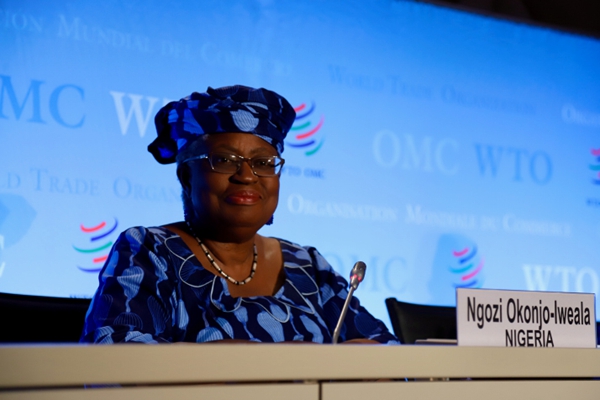WTO new head is on a mission to advance the prospects of common development
- By Charles Onunaiju
 0 Comment(s)
0 Comment(s) Print
Print E-mail Beijing Review, March 3, 2021
E-mail Beijing Review, March 3, 2021

The World Trade Organization (WTO), the rule-making body for the global trading system that started life on January 1, 1995, has just had its glass ceiling shattered, with the first woman climbing to the apex of its structure. To add to the significance, the woman in question, Ngozi Okonjo-Iweala, Nigeria's former two-time finance minister and foreign minister, is the first African appointed to be the director general of the WTO. Though she has recently acquired American citizenship, having studied, worked, and lived in the U.S. for nearly four decades, she is strongly rooted in Africa where she was born 66 years ago and had her early education.
Respected economist
The WTO has been a critical part of the international system since the emergence of the post-World War II international order. Its predecessor, the General Agreement on Tariffs and Trade (GATT), provided the rules for the global trading system since 1948 when it was founded. While GATT mainly dealt with trade in goods, the WTO has a broader mandate which includes services and trade in inventions, creations and designs (intellectual property).
The world trading system originated against the backdrop of the horrors of the two world wars and an economic depression. GATT was intended to provide a legal mechanism for tariff negotiation and make rules that would discourage countries from erecting barriers through non-tariff means.
The various negotiations including the legendary Uruguay and Doha rounds, which culminated in the formation of the WTO, were critical in establishing the contemporary global trading architecture.
It is this complex web of rule-making for trade, especially at a time when trade has emerged as the life-blood of the international system, that Okonjo-Iweala has assumed the leadership of.
Okonjo-Iweala, who had a 25-year career at the World Bank in Washington, D.C. as a development economist, is no stranger to multilateralism.
Rising to the number two position in the bank as managing director, she had the responsibility to oversee the World Bank's $81-billion operational portfolio in Africa, South Asia, Europe and Central Asia.
First appointed as Nigeria's minister of finance in the late 1990s, Okonjo-Iweala oversaw the negotiations with the Paris Club that culminated in the elimination of $30 billion of Nigeria's debt, after paying a whopping $12 billion at once to the creditors.
She had argued that paying the debt would free the country of the burden of interest payments, which, according to her, would free funds for addressing the country's huge infrastructure deficit. Critics of the massive capital flight which she engineered with the $12 billion payment insist that after the debt repayment and cancellation, there was nothing of substance in the improvement of the country's infrastructure.
However, she made enormous efforts to improve Nigeria's macroeconomic management, which included, among other things, the implementation of an oil price-based fiscal system where revenues accruing above reference benchmark oil price were saved in a special account, called excess crude account, which helped to reduce macroeconomic volatility. She also instituted a key transparency governance measure, whereby each item of local or state monthly financial allocation from the federal government of Nigeria was published in the newspapers.
In 2011, under another president, Jonathan Goodluck, she was reappointed as minister of finance with the expanded portfolio of coordinating minister for the economy, which is well acknowledged to have brought considerable stability to the macroeconomic management and even rebalancing of the country's economy. Since then, Nigeria has emerged as the largest economy in Africa, though poverty and staggering unemployment, leading to violent crimes and insurgency, remain open wounds which Nigeria is still struggling to contend with.
New helmsperson
She comes to the WTO with a lot of experience and broad international exposure that will serve her well in navigating through the negotiating crucibles that would stabilize the world trading system. In the era of multilateralism with isolated pockets of threats to it, she would have to make a compelling case for why free and fair trade is in the best interest of all.
With the China-U.S trade impasse, mostly stoked by Washington, she must weigh in to enhance an impartial mechanism for trade dispute resolution that does not pander to hegemonic power designs.
As trade in goods has evolved to a complex web of trading beyond goods to intellectual property, the WTO under Okonjo-Iweala must up its game to move in the direction of a fair and equitable trading system that leaves no member behind.
Though bilateral trading agreements remain the key component of the contemporary international system, the WTO would continue to be the guarantor and rule maker and the last port of call for dispute settlement for international trade matters and, therefore, has enormous responsibility for providing an enabling roadmap to sustain one of key human activities.
An accomplished woman long dedicated to international public service, Okonjo-Iweala is enjoined to use her new office to advance human prospects which clearly converge around the construction of a community of shared future for all humanity. Trade is one of the oldest human activities and must now be given a prime place in the restoration of the common development of all. This is the clarion call for Okonjo-Iweala.
The author is director of the Center for China Studies in Abuja, Nigeria.






Go to Forum >>0 Comment(s)